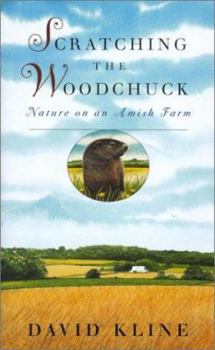Scratching the Woodchuck Nature on an Amish Farm
Select Format
Select Condition 
Book Overview
David Kline came upon a sleeping woodchuck one summer day as he walked the land near his farm. In a gesture that speaks eloquently of Kline's relationship with the natural world, he scratched the... This description may be from another edition of this product.
Format:Hardcover
Language:English
ISBN:0820319384
ISBN13:9780820319384
Release Date:January 1997
Publisher:University of Georgia Press
Length:205 Pages
Weight:1.10 lbs.
Dimensions:0.9" x 5.8" x 9.3"
Customer Reviews
4 ratings
Natural History Writing at Its Best
Published by Thriftbooks.com User , 22 years ago
Scratching the Woodchuck is quite simply the best piece of natural history writing I have read in decades. David Kline is a keen observer, a competent naturalist, and an eloquent writer. We need more books like this in our all too technology-based, human-centered society.This book takes the reader back to humanity's roots, and to our essential relationships with other species that inhabit this planet with us. Something beautiful and important is found here that has been lost to many of us for a long, long time.
Antidote for institutionalized scizophrenia
Published by Thriftbooks.com User , 23 years ago
Scratching the Woodchuck, Nature on an Amish Farm by David Kline sits on my credenza at work. I reach for it when I need an antidote for institutionalized schizophrenia.Scratching the Woodchuck is a collection of about 60 short essays. They are organized into four catagories: The Farmstead, The Fields, The Woods, Creeks and Sky and The Community. The essays are rich in adjectives and read at a slow and leisurely pace. For example:"I was startled the other day to see a meadow vole (one of those fat little short-tailed mice that abound in meadows and fields) come charging out of the grass-covered ditch and dash across the road as fast as its stumpy legs could carry it. Before the sprinting vole had reached the safety of the opposite ditch, it was followed by two more of its kin. These, however, instead of racing across the road, made large half-circles and then ran back into the same ditch twenty feet down the road. I stopped and watched the spot where the meadow voles had emerged. Soon a small pointed nose poked through the grasses and two obsidian eyes glared at me--a weasel. No wonder the voles were scared silly. Of all their enemies, nothing alarms the mouse family as much as the weasel, because there is no place to hide from the long, slender killer." Page 42.Plusses:*The essays are short. You can pick up the book and regain sanity in about 2.76 minutes.*The essays are consistently high quality writing. There is none of the unevenness that results when a book is banged out in a hurry.Minuses:*The book does not come back quickly when loaned out. "Oh, I was going to bring it back today but my wife started reading it." kind of thing.*Ultimately, you finish the book and you want more.Scratching the Woodchuck is a good book to pick up if you feel like the pea-in-a-whistle. Mr. Kline's prose will slow your heart rate and reduce your blood pressure. Mr. Kline assures us that life only appears to be fragmented. The patient observer can find the connections.Scratching the Woodchuck is probably *not* a good choice if your preference for escapism-liturature tends toward verb-packed, staccato writing (like Tom Clancy). You will find Scratching the Woodchuck maddeningly slow and boring.
Kline's book became a companion
Published by Thriftbooks.com User , 25 years ago
This story was a wonderful, lighthearted portrayal of nature on Kline's farm. The stories were short and a quick read. I found myself reading one story, every night before bed. I was not looking forward to the end of what became a daily companion. Kline is able to paint with words. He excels at describing life's simple, natural pleasures. This book could be compared to a more recent Sand County Almanac, but I didn't find that book as interesting. A good read!
Thoreau has a modern counterpart.
Published by Thriftbooks.com User , 26 years ago
Any one who has a personal copy of Walden with heavy underlining and pages falling away from the binding will read the words of David Kline with respect. This is a man so completely at one with his physical world, so at peace with his chosen lifestyle, and so appreciative of his environment that he makes Thoreau seem under-developed. While Kline, an Amish farmer who lives an economic life far out-of-step with his contemporary American culture, writes little about his religious philosophy, he is man at peace with himself and his God and he is able to convey that without talking directly about his theology. He expresses appreciation for his heritage of the family farm which has become his, and for his early teacher who taught him to see the wonders of the natural life which was found on that farm and in that area of Ohio. The life of a farmer is one of seasonal cycles which dictates the work, and the habits of the creatures of the wild. The book is roughly cyclical in scope, but has no straightforward time line. Kline writes as though engaging in easy conversation, reminiscing about berry-picking and manure-spreading, bird-watching and gardening. His life is an out-of-doors life, but he does not complain about the weather! Bad weather seems to be a time to read, and he cites authors from Kathleen Norris to A. Leopold, evidence that he is as much at home with the written word as with the topography of his farm Kline's little book makes me want to know more about him, to know how he relates to the strange and stressed humans with whom he shares this land. The book is as much spirtitual as scientific in content, bringing a sense of peace in a too-busy world. One waits for another from this delightful author.




